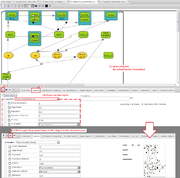Difference between revisions of "Diagram document"
m |
|||
| Line 1: | Line 1: | ||
| − | {{ | + | {{stub}} |
'''Diagrams ([[wikipedia:Graph_(mathematics)|graphs]])''' as two-dimensional geometric representations of information according to [[graphic notation]] conventions are provided by a number of databases and tools in [[BioUML]]. | '''Diagrams ([[wikipedia:Graph_(mathematics)|graphs]])''' as two-dimensional geometric representations of information according to [[graphic notation]] conventions are provided by a number of databases and tools in [[BioUML]]. | ||
[[File:Diagram_view.png|thumb|A diagram opened in BioUML web edition]] | [[File:Diagram_view.png|thumb|A diagram opened in BioUML web edition]] | ||
Revision as of 18:25, 13 June 2013
| This page or section is a stub. Please add more information here! |
Diagrams (graphs) as two-dimensional geometric representations of information according to graphic notation conventions are provided by a number of databases and tools in BioUML.
The general scheme of their use is that an overview of a graph is shown in the viewparts area, under the Overview tab, while its full-sized view is shown in the document pane above, where usually only a part of the whole diagram is visible.
Diagrams contain components shown as ovals, reactions as squares, and links as lines or arrows, as defined by the graphic notation.
The currently displayed section can be shifted
- either in the document pane by clicking and dragging the "canvas" of the diagram or using the scrollbars,
- or by shifting (clicking and dragging) the blue-dotted rectangle (representing the area now viewed in the document pane) in the Overview tab of the viewparts area.
To facilitate orientation in large diagrams, individual edges are highlighted (turning from a thin, usually black arrow into a thick light-blue one) when hovered over.
Clicking on an individual node can show information about this component in the property inspector (Info tab) of the information box (this works for BioModels). Double-clicking on a node will activate the link to reference information on an external website, if any.
Diagrams can be zoomed in and zoomed out by clicking on the buttons ![]() or
or ![]() , correspondingly, in the general control panel above.
, correspondingly, in the general control panel above.
Diagrams can be exported in a number of formats by clicking on the button ![]() in the general control panel above.
in the general control panel above.
Adjusting diagram layout
Under the Layout tab of the viewparts area, you can change the layout of the diagram. First, you can select one of the following layout schemes:
- Hierarchical layout (default),
- Orthogonal layout,
- Force directed layout,
- Cross cost grid layout,
- Grid layout.
- Hierarchical diagram layout.png
Hierarchical layout
- Orthogonal diagram layout.png
Orthogonal layout
- Force directed diagram layout.png
Force directed layout
- Crosscostgrid diagram layout.png
Cross cost grid layout
- Grid diagram layout.png
Grid layout
When you have selected another layout type, you need to press the Prepare layout button (![]() ) - the newly calculated layout will be shown on the right in the same tab. Pressing Apply layout (
) - the newly calculated layout will be shown on the right in the same tab. Pressing Apply layout (![]() ) will transfer the new layout to the diagram in the document pane.
) will transfer the new layout to the diagram in the document pane.
Some of the re-layouting options may take considerable time. If you want to interrupt the process, press the Stop layout button (![]() ).
).
The layout that has been applied to the document pane can be further edited manually. A single click on a node (component or reaction node) highlights it; it can now be moved with the mouse pointer, or can be deleted (right-clicking opens the context menu with the Remove option).
The results of manual editing can be saved to the Layout tab of the viewparts area (![]() ) so that they will be retained for later work.
When you try to close the diagram's tab in the document pane, a dialog window will appear asking you to confirm or discard all the changes made to the diagram during the working session.
) so that they will be retained for later work.
When you try to close the diagram's tab in the document pane, a dialog window will appear asking you to confirm or discard all the changes made to the diagram during the working session.
Further editing of the layout schemes can be done by parameter settings in the Layout tab of the viewparts area.

